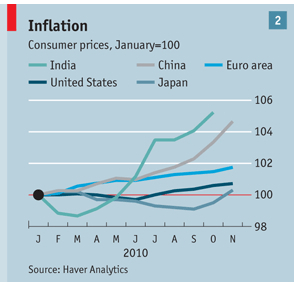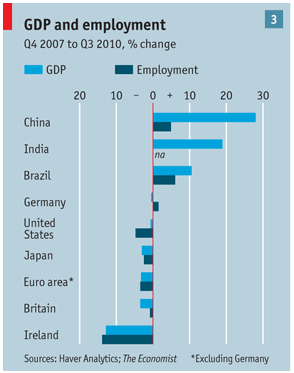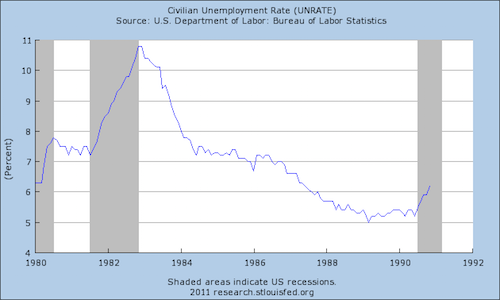Matthew Yglesias's Blog, page 2458
January 3, 2011
The Public Domain That Might Have Been
Duke University's Center for the Study of the Public Domain reports from an alternate universe in which congress hadn't randomly decided in the mid-1970s that creators of copyright-eligible works of intellectual property lacked adequate commercial incentives to innovate:

Current US law extends copyright protections for 70 years from the date of the author's death. (Corporate "works-for-hire" are copyrighted for 95 years.) But prior to the 1976 Copyright Act (which became effective in 1978), the maximum copyright term was 56 years (an initial term of 28 years, renewable for another 28 years). Under those laws, works published in 1954 would be passing into the public domain on January 1, 2011.
Examples:
— The first two volumes of J.R.R. Tolkien's Lord of Rings trilogy: The Fellowship of the Ring and The Two Towers.
— Samuel Beckett's Waiting for Godot (his own translation/adaptation of the original version in French, En attendant Godot, published in 1952).
— Kingsley Amis' Lucky Jim.
— Aldous Huxley's The Doors of Perception.
— Dr. Seuss' Horton Hears a Who!.
— Pauline Réage's Histoire d'O.
— Fredric Wertham's Seduction of the Innocent, subtitled "The influence of comic books on today's youth."
— Tennessee Williams' Cat on a Hot Tin Roof.
— Mac Hyman's No Time for Sergeants.
— Alan Le May's The Searchers.
— C.S. Lewis' The Horse and His Boy, the fifth volume of The Chronicles of Narnia.
— Alice B. Toklas' The Alice B. Toklas Cookbook.
Stringent restrictions on the use of intellectual property raise the cost of creation for commercial and non-commercial producers alike. They increase burdens identically for people subjectively motivated by greed, for those subjectively motivated by a desire for fame, and for those who genuinely value creating works of merit. On the other side of the ledger, stringent restrictions do increase the incentives for innovation as well. But they only increase the pecuniary incentives available to greed-motivated commercial producers. In other words, hope everyone's looking forward to Transformers 3.
Meanwhile, in exchange for shifting the balance toward commercial production, we also increase deadweight loss for consumers.


January 2, 2011
Mankiw's Strange Advice
Based on his experience as a Republican Party operative, Greg Mankiw is in fact well-positioned to give Barack Obama advice on how to reach compromise with Republican Party politicians. But based on his track-record as a Republican Party operative, Greg Mankiw is also the kind of guy who might engage in dishonest propaganda activities designed to make Republican Party politicians look good and their opponents look bad. His advice column seems clearly geared toward priority number two:
But now it is time to pivot and address the long-term fiscal problem. In last year's proposed budget, you projected a rising debt-to-G.D.P. ratio for as far as the eye can see. That is not sustainable. Conservatives believe that if the nation credibly addresses this long-term problem, such a change will bolster confidence and have positive short-run effects as well.
It may or may not be the case that addressing the long-term fiscal problem is a good idea. But there's no reason to believe this is a viable basis for a political compromise. Consider:
When budget surpluses were projected 10 years ago, this was described by Republicans as a policy problem to be solved by tax cuts.
When Republicans controlled the government, they consistently acted to make deficits larger.
Republicans opposed the deficit-reducing Affordable Care Act.
Republicans opposed the deficit-reducing American Climate and Energy Security Act.
Republicans opposed the deficit-reducing DREAM Act.
When Barack Obama proposed some deficit-increasing tax cuts, Republicans insisted that they would go along if and only if he added additional deficit increasing tax cuts.
Republicans are planning to replace deficit-mitigating PAYGO rules with deficit increasing CUTGO rules.
Note that this is not a new development. There was a major battle within the Republican Party in the 1970s between a moderate faction associated with Dwight Eisenhower and Gerald Ford and a conservative faction associated with Ronald Reagan. One key issue at that time was whether the focus should be on deficits or on low tax rates for rich people. And the conservatives won the battle. That's why since 1980, the more conservatives you elect the bigger the deficit you get.
Rather than listening to Mankiw, my advice to Obama would be to take the lessons of history seriously. Republicans are deeply interested in lower tax rates on high-income individuals. There may or may not be other things they care about on some level, but the party's level of concern about all other issues pales in comparison to its level of concern about lowering tax rates on high-income individuals. Policy compromises, if they're reached, are overwhelmingly likely to involve Obama agreeing to lower tax rates on high-income individuals in exchange for Republicans agreeing to something else. That "something else" might entail net deficit reduction (as in the 1997 budget deal) or net deficit increases (as in the 2010 tax deal) depending on what it is Obama wants to ask for. But what Republicans want is lower tax rates on high-income people.


Gorgon Stare

Ellen Nakashima and Craig Whitlock report for the Washington Post on the US military's latest initiative in its never-ending quest to solve political problems with technological solutions:
This winter, the Air Force is set to deploy to Afghanistan what it says is a revolutionary airborne surveillance system called Gorgon Stare, which will be able to transmit live video images of physical movement across an entire town.
The system, made up of nine video cameras mounted on a remotely piloted aircraft, can transmit live images to soldiers on the ground or to analysts tracking enemy movements. It can send up to 65 different images to different users; by contrast, Air Force drones today shoot video from a single camera over a "soda straw" area the size of a building or two.
Most of all, this seems like a sad example of the decline of classical education in the United States. If you take current Air Force surveillance technology and ask "in what ways does this differ from the gaze of a gorgon" the natural response is "when you look into a gorgon's eyes, you turn to stone, whereas today's USAF surveillance has no petrification powers whatsoever." The Gorgon Stare initiative appears to improve on current surveillance in a variety of ways, but involves absolutely no turning of anything into stone.


The Annals of History

From the 1988 Democratic Party Platform:
WE BELIEVE that illegal drugs pose a direct threat to the security of our nation from coast to coast, invading our neighborhoods, classrooms, homes and communities large and small; that every arm and agency of government at every federal, state and local level—including every useful diplomatic, military, educational, medical and law enforcement effort necessary—should at long last be mobilized and coordinated with private efforts under the direction of a National Drug "Czar" to halt both the international supply and the domestic demand for illegal drugs now ravaging our country; and that the legalization of illicit drugs would represent a tragic surrender in a war we intend to win. We believe that this effort should include comprehensive programs to educate our children at the earliest ages on the dangers of alcohol and drug abuse, readily available treatment and counseling for those who seek to address their dependency, the strengthening of vital interdiction agencies, such as the U.S. Coast Guard and Customs, a summit of Western hemispheric nations to coordinate efforts to cut off drugs at the source, and foreign development assistance to reform drug-based economies by promoting crop substitution.
Democrats may not have won the election, but at least they got their "drug czar" job created and it's policy wins that really count.


Chris Christie Should Do His Second-Most-Important Job Properly
Steve Benen flags Chris Christie's defense of leaving the state governorless amidst the snowstorm by, among other things, saying "My first and most important responsibility, in my view, is as a husband and a father."
In a Real Talk sense, I think this is false. But be that as it may. What about Christie's work in his second most important job? New Jersey, historically, hasn't had the office of lieutenant governor. But the state authorities decided very recently that was a bad idea and created one. It's really not a post that carries with it a ton of responsibilities, but filling in for the governor if a situation develops while he's on vacation in Florida is on the list. Under the circumstances, it seems pretty clear that the governor and the lieutenant governor shouldn't go on vacation simultaneously and that the governor should put some effort into working this out. Failure to coordinate the schedules properly hardly makes Christie history's greatest monster, but it was an error. An error that nine times out of ten probably would have gone unnoticed, but the snowstorm meant the error turned into a problem for the state. The decent response to a small-but-real error is just to apologize and move on but Christie's managed to turn an asshole persona into national YouTube stardom so I guess he thinks it's best to act like a jerk.


January 1, 2011
Never Let a Good Headline Go to Waste

McKay Coppins has a story in Newsweek arguing that former Utah Governor and current Ambassador to Beijing Jon Huntsman will run for President in 2012. James Fallows, sensibly, isn't buying it:
Huntsman is part of the Obama Administration. He is right in the middle of dealings with America's most important foreign-policy partner/challenge. So in the GOP Primaries, how exactly is he going to out-Obama anyone else in the field, given that he has served Obama (and, yes, the country) so loyally? The retorts from all the other Republicans are almost too easy. "If Ambassssadorrr Huntsman is so concerned about the Obama threat to America, then why,…?"
And if he got through that process, he would run against his current commander-in-chief …. how? And why? What is the issue of principle so important that it compels him to challenge Obama's continuation in office, but has not justified any disagreement while he's serving now? "Huntsman 2016″ would be a very logical inference from his current position. "Huntsman 2012″ would require suspension of basic laws of politics and common sense.
Quite so. That said "The Manchurian Candidate" is an excellent headline for an article about the hypothetical presidential campaign of an ambassador to China. So on those grounds alone I think you have to run with the story. Second, I do think that if you look at the history of Republican presidential nominees there's something to be said for getting in the game and running even if the time isn't right. Ronald Reagan, George HW Bush, and John McCain all ran and lost before they got the nomination.


The Road Ahead
Krugman notes that we'd have to start doing something wildly different to get to full employment any time soon: "[S]uppose that from here on out we average 4.5 percent growth, which is way above any forecast I've seen. Even at that rate, unemployment would be close to 8 percent at the end of 2012, and wouldn't get below 6 percent until midway through Sarah Palin's first term."
With regard to the Palin administration, it's always worth noting that rates of change matter more than levels. Ronald Reagan won a landslide re-election on the strength of a nearly 7.5% unemployment rate so there's no reason Barack Obama couldn't win with 8 percent. In narrowly political terms, the problem is that the odds of doing even that well don't look so great.


Decline is a Choice
I don't think large real reductions in basic science and R&D are going to benefit America over the long haul, do you?
Alan Leshner, CEO of the American Association for the Advancement of Science, told the AFP news agency that the spending cuts could translate into a five to ten percent cut in research and development in the science sector for fiscal years 2011 and 2012.
"One big fear is that one version of the Republican agenda suggested bringing funding back to 2008 levels and that for science would be catastrophic," said Leshner. "These kinds of budget cuts work against the ultimate national goals of restoring the US economy and its international prowess."
Nearly all "competitor countries, including India, China and Korea, are increasing investments in science and engineering research, development, and education," he added. "US funding looks like it could be heading the opposite direction."
Don't buy the "competitor countries" argument too much (though it may be useful for scaring House members), increased Asian spending on these things will have spillover benefits for the USA. But it's absolutely perverse to respond to a cyclical downturn in economic activity by curtailing useful investments in long-term acquisition of knowledge. That's how a pothole turns into a "car spinning out of control" scenario.


Parking and Barber Regulation, Together at Last
Here's a little slice of life from Omaha (PDF) where city officials are evaluating a man's plan to cut other people's hair in exchange for money in a property he owns:

It looks like this story is going to have a happy ending and the man will get his permission, but for the millionth time this isn't something that needs regulating. Land is a valuable commodity. And ability to park one's car is also valuable. Property owners in any given area are perfectly capable of evaluating what portion of land should be dedicated to parking based on the market demand for parking relative to the demand for other uses of land. Mandating more parking than the market demands is bad for the environment, bad for economic growth, and constitutes a regressive transfer from poor to the non-poor. I was very glad to see one New York Times column dedicated to this issue in 2010 and in 2011 I'm looking forward to hounding the mass media into paying more attention than that.


December 31, 2010
Future Shock
The Economist did an interesting 2010 in charts feature to close the year out. Combining their chart 2:

With their chart 3:

I think what we see is that for unclear reasons leaders in developed countries have basically given up on trying to have economic growth. The US, the Eurozone, and Japan are so terrified that real growth might lead to growth-imperiling inflation that we've just decided to live without the growth in the first place. To me this is also Tyler Cowen's real message here.
But if the developed world has decided it's not interested in growth anymore, I think we can look forward to many more stories like this:
With a market share of 31.5 percent, Nokia is still the largest vendor of handsets in the Indian market, followed by Chinese brand G'Five with about 10 percent share, IDC said on Wednesday.
That's via full-time professional mobile device market analyst Horace Dedieu who remarks: "No, I haven't heard of G'Five either."
Welcome to the teens.


Matthew Yglesias's Blog
- Matthew Yglesias's profile
- 72 followers




